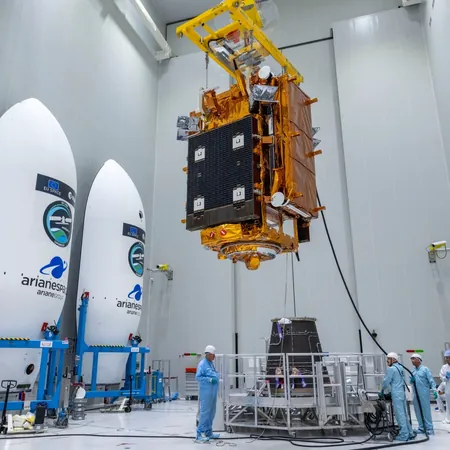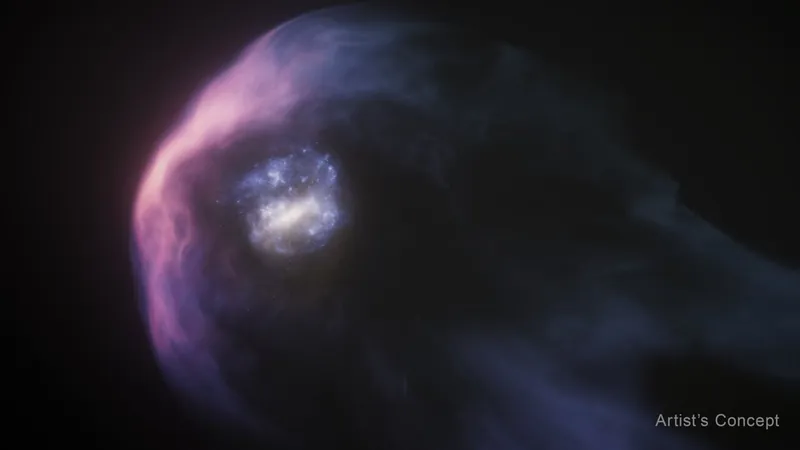
Vega C Launch Delayed by a Day: Vital Earth Observation Mission at Stake!
2024-11-27
Author: Nur
In an unexpected turn of events, European space authorities have announced a slight delay in the much-anticipated return of the Vega C rocket, now set for launch next week. Originally scheduled for December 3, the launch of the Sentinel-1C Earth observation satellite has been postponed by at least a day due to some precautionary checks needed on the rocket's systems.
Arianespace, the launch service provider, confirmed the delay on November 27, indicating that it will reveal an updated launch date by November 29. Regardless of the exact day, the liftoff is scheduled for 4:20 p.m. Eastern time within an instantaneous launch window—a critical detail that space enthusiasts and stakeholders are keenly watching.
During a European Space Agency (ESA) media briefing, representatives from Arianespace and Avio (the main contractor behind the Vega C) downplayed the delay, suggesting that the technical issues at hand are relatively minor. Stéphane Israël, Arianespace's CEO, stated, “I don’t think there is a lot to elaborate on,” emphasizing that the concerns are limited in scope.
Giulio Ranzo, CEO of Avio, echoed this sentiment, asserting, “When we see something that we are not completely satisfied with, we love to intervene and conduct more checks.” Such a cautious approach epitomizes the philosophy of extensive safety protocols within the aerospace sector.
This mission, marking the Vega C's return after a launch failure in December 2022 caused by issues with the Zefiro-40 second stage, is particularly significant. The mishap prompted a redesign of the motor’s nozzle and subsequent rigorous testing. Ranzo expressed confidence in the new design, stating, "The two tests that we have performed, along with joint work with the ESA, have demonstrated excellent performance of the revamped Zefiro-40."
Moreover, the Vega C's successful deployment is crucial in helping Europe regain its independent access to space—a need exacerbated by the recent reliance on SpaceX for several missions. Toni Tolker-Nielsen, ESA's Director of Space Transportation, highlighted this moment as pivotal for Europe, characterizing it as "the reestablishment of independent access to space."
The Sentinel-1C satellite, constructed by Thales Alenia Space, plays a pivotal role in enhancing Europe’s Earth observation capabilities. It aims to replace the malfunctioning Sentinel-1B satellite, deemed lost in August 2022, and will join the aging Sentinel-1A to support the Copernicus Earth observation program. This initiative greatly aids in environmental monitoring, disaster management, and agricultural planning by providing essential radar imagery.
Christoph Kautz, from the European Commission, emphasized the essential nature of the Sentinel-1 mission, noting that around 150,000 data products from this satellite's family are published monthly, underscoring its importance as a "workhorse" of Copernicus.
A notable improvement in Sentinel-1C is the incorporation of an Automatic Identification System (AIS) payload, which will enable the tracking of ships that broadcast AIS signals, enhancing maritime surveillance significantly. The integration of this technology will allow for more comprehensive data collection and may yield substantial benefits in various maritime operations.
Once launched, the Sentinel-1C will require approximately three to six months to fully commission before commencing regular operations. “We’ll try to do this as fast as possible, but it’s going to be a minimum of three months,” said Simonetta Cheli, ESA’s director of Earth observation programs.
As anticipation builds around the new launch date, the Vega C rocket's successful flight would mark a significant milestone in rejuvenating European space endeavors and maintaining vital Earth observation capabilities. Stay tuned as we bring you the latest updates on this critical mission!


 Brasil (PT)
Brasil (PT)
 Canada (EN)
Canada (EN)
 Chile (ES)
Chile (ES)
 España (ES)
España (ES)
 France (FR)
France (FR)
 Hong Kong (EN)
Hong Kong (EN)
 Italia (IT)
Italia (IT)
 日本 (JA)
日本 (JA)
 Magyarország (HU)
Magyarország (HU)
 Norge (NO)
Norge (NO)
 Polska (PL)
Polska (PL)
 Schweiz (DE)
Schweiz (DE)
 Singapore (EN)
Singapore (EN)
 Sverige (SV)
Sverige (SV)
 Suomi (FI)
Suomi (FI)
 Türkiye (TR)
Türkiye (TR)